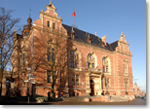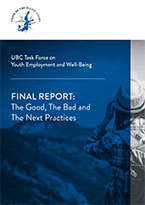Secretariat
Wały Jagiellońskie 1
80-853 Gdańsk Poland
tel. +48 58 301 09 17
tel. +48 58 301 91 23
fax +48 58 301 76 37
 Contact us
Contact us


New Hansa of Sustainable Ports and Cities Stakeholder Seminar, Lübeck 22 June 2004
The project "New Hansa" in the light of the Sustainable Development Strategy of the Union of the Baltic Cities
Dear President of the Hanseatic City of Lübeck, Ladies and Gentlemen,
Let me start by congratulating Lübeck and its Stadtwerke and port on their wonderful pioneering work on sustainable development issues at ports during the recent years. Dear Friends, your work has been of utmost value and inspiration for many other cities and for the whole Union of the Baltic Cities. In my eyes, your work has been an excellent example of what can be achieved by innovative and courageous pioneering initiatives. Having said that, of course, one should admit that there remains a lot to be done before our ports will be totally sustainable. However, you have paved the way for a good start to the Baltic Sea Regional co-operation on this challenge, and the UBC is sincerely grateful to you for that!
I also want to Thank the great Baltic shipping company Finnlines for their presence in the project. It is great that you are onboard, as these issues really cannot be solved by the cities and ports alone. Your contributions and co-operation are crucial, and I hope that other shipping lines will soon follow your example and enter the Baltic New Hansa movement on sustainable ports.
An unique value of this project is indeed the well-designed way how all relevant stakeholders should work together for mutual benefit. Better ports are important both for the cities and for the ships.
As an organisation, the Union of the Baltic Cities is strongly committed to sustainable development. Advancing sustainable development in our member cities and in the Baltic Sea Region is an inherent part of our strategy. For the implementation of this element of the UBC Strategy, our VII General Conference, held in Klaipėda last October, adopted a strategic sustainable development action programme for six years, 2004-2009. This Action Programme is called the Roadmap of Sustainable Baltic Cities. Its implementation is in full speed: several important projects are on-going. The total budget of the programme is 10 Million euros and almost half of this fund will already be operational by the end of this year. New Hansa is one of the largest projects of this programme.
We are very proud of having the New Hansa project within the framework of our programme - and at the same time we are very grateful to the Hanseatic City of Lübeck, Stadtwerke Lübeck and the Baltic Energy Forum for their leading roles and co-ordination of this highly important project. You can certainly count on us that we will do our best to effectively lobby and disseminate the outcomes of the project.
Baltic Cities are extremely active on sustainable development work: over 90% of the 104 members of the UBC have their own local sustainable development programme. Internationally comparing, this is a huge level of activity. And, what is best about it is that these are not just programmes, but most of the cities are implementing many good activities and are integrating sustainable development into their overall strategies and functions. This also means that our cities actually are European and Global forerunners on sustainable development. As Secretary General of the UBC, I am of course very proud of this. It is a great pleasure to work with such excellent cities!
In the Global and European policy arenas, the discussions and recently adopted policies on sustainable development also emphasise implementation of concrete sustainable development actions - based on the previous focus on making sustainable development programmes. Now it is time to implement the programmes and turn words on paper into concrete actions. The Johannesburg World Summit on Sustainable Development in August 2002 adopted the Plan of Implementation, which emphasises a number of concrete issues. On the occasion of the Summit, also the specific session of local governments of the world was organised. This Local Government session, co-ordinated by ICLEI, endorsed the concept of Local Action 21 - based on Local Agenda 21 and emphasising concrete actions and implementation. The European Union, as part of the 6th Environmental Action Programme, adopted for the first time an integrated Thematic Strategy on the Urban Environment (by Community decision in 2002). The further detailed operational strategy is currently under preparation at the Commission, and UBC is contributing to its shaping in several EU working groups.
The New Hansa project of course is fully in line with these main policy developments on Global and European arenas. It also is very relevant for the development of European port and air quality policies and has good dissemination potential in form of good practices also to other parts of Europe. On Baltic Sea Regional level, the project has already been included by Baltic 21 among the three candidate BSR Light-house projects on sustainable development. These three projects are today being presented to the media also on the occasion of the meeting of Prime Ministers of Baltic Sea Region countries in Estonia, organised by the Coalition of Baltic Sea States and Baltic 21.
Within the UBC Agenda 21 Action Programme, the Roadmap for Sustainable Baltic Cities, we have five thematic focus areas. These are:
Good governance and sustainable urban management
Sustainable use of energy and resources
Good living environment and nature protection
Sustainable economy and transport
Social integration and health.
I am very happy to say - and I am sure you would agree - that the New Hansa project has got a good potential to contribute to most of these. It is dealing with management and governance, it addresses sustainable use of energy and resources, it has a potential to improve the living environment in port cities, it may make the air in port cities cleaner and healthier, and - it certainly deals with transport and economy!
My conclusion is that you are - my Dear Baltic Friends - dealing with a remarkable project with plenty of potential to benefit our cities and also to contribute on Baltic Sea Regional and European levels. To underline the commitment and support of the UBC to your case, I would like to mention that the topic of our next General Conference, number VIII, to be held in Turku in October 2005 will most likely deal with logistical corridors in the Baltic Sea Region. The UBC has also recently established a Task Force on this issue. The co-ordinators of the New Hansa project will naturally be invited to join this task force.
Our common goal is also that the VIII Genaral Conference of the UBC in October 2005 would endorse the core policy document resulting from the New Hansa project, the Baltic Memorandum on Sustainable Ports. Before that day, there is some work for all of us to do. Please, make this memorandum a good paper based on your research findings, good practices and discussions, so we can back it with the full power of the UBC and have it endorsed and implemented. Meanwhile the UBC - especially our Commission on Environment Secretariat - will take all efforts and use all our channels to help the New Hansa to get strong support of different Baltic Sea Regional actors for the Memorandum.
Ladies and Gentlemen, the Baltic Sea is indeed a very unique sea and the Baltic Sea Region is a very special area in Europe. Our sea is a new (almost) inside sea of the European Union and our co-operation within the region is extremely strong on all levels of government as well as within the civic societies. This gives as good opportunities to create effective trans-national mechanisms and plans. Let us enhance our efforts within the Baltic Sea Region - its cities, sub-regions, states and stakeholders - to tackle the major challenge of creating sustainable port policies. Thank you.
Paweł Żaboklicki




